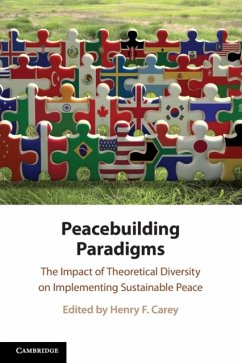Peacebuilding Paradigms
Herausgeber: Carey, Henry F
Peacebuilding Paradigms
Herausgeber: Carey, Henry F
- Broschiertes Buch
- Merkliste
- Auf die Merkliste
- Bewerten Bewerten
- Teilen
- Produkt teilen
- Produkterinnerung
- Produkterinnerung
This book looks at how different schools of thought within the subfields of International Relations and Comparative Politics assess the successes and failures of peacebuilding missions. No theory does it alone, so the best approach to explaining peacebuilding is a comprehensive one that uses insights from multiple schools of thought or paradigms.
Andere Kunden interessierten sich auch für
![Routledge Handbook of Peacebuilding and Ethnic Conflict Routledge Handbook of Peacebuilding and Ethnic Conflict]() Routledge Handbook of Peacebuilding and Ethnic Conflict48,99 €
Routledge Handbook of Peacebuilding and Ethnic Conflict48,99 €![Paradigms of International Human Rights Law Paradigms of International Human Rights Law]() Aaron X. Fellmeth (Professor of Law and Willard H. Pedrick DistinguParadigms of International Human Rights Law185,99 €
Aaron X. Fellmeth (Professor of Law and Willard H. Pedrick DistinguParadigms of International Human Rights Law185,99 €![Women's Rights in Armed Conflict under International Law Women's Rights in Armed Conflict under International Law]() Catherine O'Rourke (University of Ulster)Women's Rights in Armed Conflict under International Law50,99 €
Catherine O'Rourke (University of Ulster)Women's Rights in Armed Conflict under International Law50,99 €![The Disabled Contract The Disabled Contract]() Jonas-Sebastien Beaudry (Montreal McGill University)The Disabled Contract39,99 €
Jonas-Sebastien Beaudry (Montreal McGill University)The Disabled Contract39,99 €![Fundamental Rights Fundamental Rights]() Fundamental Rights49,99 €
Fundamental Rights49,99 €![Litigating the Climate Emergency Litigating the Climate Emergency]() Litigating the Climate Emergency45,99 €
Litigating the Climate Emergency45,99 €![Judicial Convergence and Fragmentation in International Human Rights Law Judicial Convergence and Fragmentation in International Human Rights Law]() Elena Abrusci (Brunel University)Judicial Convergence and Fragmentation in International Human Rights Law117,99 €
Elena Abrusci (Brunel University)Judicial Convergence and Fragmentation in International Human Rights Law117,99 €-
-
-
This book looks at how different schools of thought within the subfields of International Relations and Comparative Politics assess the successes and failures of peacebuilding missions. No theory does it alone, so the best approach to explaining peacebuilding is a comprehensive one that uses insights from multiple schools of thought or paradigms.
Hinweis: Dieser Artikel kann nur an eine deutsche Lieferadresse ausgeliefert werden.
Hinweis: Dieser Artikel kann nur an eine deutsche Lieferadresse ausgeliefert werden.
Produktdetails
- Produktdetails
- Verlag: Cambridge University Press
- Seitenzahl: 423
- Erscheinungstermin: 7. Juli 2022
- Englisch
- Abmessung: 229mm x 152mm x 22mm
- Gewicht: 608g
- ISBN-13: 9781108718035
- ISBN-10: 1108718035
- Artikelnr.: 63690333
- Herstellerkennzeichnung
- Libri GmbH
- Europaallee 1
- 36244 Bad Hersfeld
- gpsr@libri.de
- Verlag: Cambridge University Press
- Seitenzahl: 423
- Erscheinungstermin: 7. Juli 2022
- Englisch
- Abmessung: 229mm x 152mm x 22mm
- Gewicht: 608g
- ISBN-13: 9781108718035
- ISBN-10: 1108718035
- Artikelnr.: 63690333
- Herstellerkennzeichnung
- Libri GmbH
- Europaallee 1
- 36244 Bad Hersfeld
- gpsr@libri.de
List of figures; List of tables; Acknowledgments; Foreword George Lopez;
Introduction: bridging the conceptual and theoretical divides on peace and
peacebuilding Henry F. Carey and Onur Sen; Part I. The Realist Paradigm: 1.
Strategies for peace Michael Fowler; 2. Realism, rationalism, and peace: a
top-down and a staged perspective Norrin M. Ripsman; 3. Building peace
through social relationships: a primatological perspective Sarah F.
Brosnan; Part II. The Liberal Paradigm: 4. Liberal peacebuilding: bringing
domestic politics back in Louis-Alexandre Berg; 5. Conflict prevention and
management I. William Zartman; Part III. The Constructivist Paradigm: 6.
The social construction of peacebuilding Brandon Howe; 7. Generations of
constructing peace: the constructivism paradigm and peacebuilding Erin
McCandless and Timothy Donais; Part IV. The Cosmopolitan Paradigm: 8. A
pluralist cosmopolitanism for the 21st century Richard A. Falk; 9. The
international law of peace Henry F. Carey and Rebecca Sims; 10. Islamic
Gnosticism and peace: a paradigmatic shift in pursuit of peace Farid
Mirbagheri; Part V. The Critical Theory Paradigm: 11. Critical approaches
to peacebuilding Jacob Mundy; 12. A new paradigm: engendered-sustainable
peace and security Úrsula Oswald Spring and Stacey M. Mitchell; 13. From
Scylla to Charybdis? The risks and opportunities of digital peacebuilding
Oliver P. Richmond and Ioannis Tellidis; Part VI: The Locality Paradigm:
14. Envisioning peace/transforming conflict: a global approach to peace
Sabine Kurtenbach; 15. Paradigm partners for locally grounded peacebuilding
John Hoven; 16. Cultural peacebuilding Aigul Kulnazarova; Part VII. The
Policy Paradigm: 17. Peacebuilding paradigm from the perspective of policy
approach: its outline through comparison Chigumi Kawaguchi and Josuke
Ikeda; 18. A bottom-up view at peacebuilding: pragmatism, public opinion
and the individual as unit of analysis in post-conflict societies Ridvan
Peshkopia; 19. Conclusion: a hybrid approach to understanding peacebuilding
Henry F. Carey and Stacey M. Mitchell; Bibliography; Index.
Introduction: bridging the conceptual and theoretical divides on peace and
peacebuilding Henry F. Carey and Onur Sen; Part I. The Realist Paradigm: 1.
Strategies for peace Michael Fowler; 2. Realism, rationalism, and peace: a
top-down and a staged perspective Norrin M. Ripsman; 3. Building peace
through social relationships: a primatological perspective Sarah F.
Brosnan; Part II. The Liberal Paradigm: 4. Liberal peacebuilding: bringing
domestic politics back in Louis-Alexandre Berg; 5. Conflict prevention and
management I. William Zartman; Part III. The Constructivist Paradigm: 6.
The social construction of peacebuilding Brandon Howe; 7. Generations of
constructing peace: the constructivism paradigm and peacebuilding Erin
McCandless and Timothy Donais; Part IV. The Cosmopolitan Paradigm: 8. A
pluralist cosmopolitanism for the 21st century Richard A. Falk; 9. The
international law of peace Henry F. Carey and Rebecca Sims; 10. Islamic
Gnosticism and peace: a paradigmatic shift in pursuit of peace Farid
Mirbagheri; Part V. The Critical Theory Paradigm: 11. Critical approaches
to peacebuilding Jacob Mundy; 12. A new paradigm: engendered-sustainable
peace and security Úrsula Oswald Spring and Stacey M. Mitchell; 13. From
Scylla to Charybdis? The risks and opportunities of digital peacebuilding
Oliver P. Richmond and Ioannis Tellidis; Part VI: The Locality Paradigm:
14. Envisioning peace/transforming conflict: a global approach to peace
Sabine Kurtenbach; 15. Paradigm partners for locally grounded peacebuilding
John Hoven; 16. Cultural peacebuilding Aigul Kulnazarova; Part VII. The
Policy Paradigm: 17. Peacebuilding paradigm from the perspective of policy
approach: its outline through comparison Chigumi Kawaguchi and Josuke
Ikeda; 18. A bottom-up view at peacebuilding: pragmatism, public opinion
and the individual as unit of analysis in post-conflict societies Ridvan
Peshkopia; 19. Conclusion: a hybrid approach to understanding peacebuilding
Henry F. Carey and Stacey M. Mitchell; Bibliography; Index.
List of figures; List of tables; Acknowledgments; Foreword George Lopez;
Introduction: bridging the conceptual and theoretical divides on peace and
peacebuilding Henry F. Carey and Onur Sen; Part I. The Realist Paradigm: 1.
Strategies for peace Michael Fowler; 2. Realism, rationalism, and peace: a
top-down and a staged perspective Norrin M. Ripsman; 3. Building peace
through social relationships: a primatological perspective Sarah F.
Brosnan; Part II. The Liberal Paradigm: 4. Liberal peacebuilding: bringing
domestic politics back in Louis-Alexandre Berg; 5. Conflict prevention and
management I. William Zartman; Part III. The Constructivist Paradigm: 6.
The social construction of peacebuilding Brandon Howe; 7. Generations of
constructing peace: the constructivism paradigm and peacebuilding Erin
McCandless and Timothy Donais; Part IV. The Cosmopolitan Paradigm: 8. A
pluralist cosmopolitanism for the 21st century Richard A. Falk; 9. The
international law of peace Henry F. Carey and Rebecca Sims; 10. Islamic
Gnosticism and peace: a paradigmatic shift in pursuit of peace Farid
Mirbagheri; Part V. The Critical Theory Paradigm: 11. Critical approaches
to peacebuilding Jacob Mundy; 12. A new paradigm: engendered-sustainable
peace and security Úrsula Oswald Spring and Stacey M. Mitchell; 13. From
Scylla to Charybdis? The risks and opportunities of digital peacebuilding
Oliver P. Richmond and Ioannis Tellidis; Part VI: The Locality Paradigm:
14. Envisioning peace/transforming conflict: a global approach to peace
Sabine Kurtenbach; 15. Paradigm partners for locally grounded peacebuilding
John Hoven; 16. Cultural peacebuilding Aigul Kulnazarova; Part VII. The
Policy Paradigm: 17. Peacebuilding paradigm from the perspective of policy
approach: its outline through comparison Chigumi Kawaguchi and Josuke
Ikeda; 18. A bottom-up view at peacebuilding: pragmatism, public opinion
and the individual as unit of analysis in post-conflict societies Ridvan
Peshkopia; 19. Conclusion: a hybrid approach to understanding peacebuilding
Henry F. Carey and Stacey M. Mitchell; Bibliography; Index.
Introduction: bridging the conceptual and theoretical divides on peace and
peacebuilding Henry F. Carey and Onur Sen; Part I. The Realist Paradigm: 1.
Strategies for peace Michael Fowler; 2. Realism, rationalism, and peace: a
top-down and a staged perspective Norrin M. Ripsman; 3. Building peace
through social relationships: a primatological perspective Sarah F.
Brosnan; Part II. The Liberal Paradigm: 4. Liberal peacebuilding: bringing
domestic politics back in Louis-Alexandre Berg; 5. Conflict prevention and
management I. William Zartman; Part III. The Constructivist Paradigm: 6.
The social construction of peacebuilding Brandon Howe; 7. Generations of
constructing peace: the constructivism paradigm and peacebuilding Erin
McCandless and Timothy Donais; Part IV. The Cosmopolitan Paradigm: 8. A
pluralist cosmopolitanism for the 21st century Richard A. Falk; 9. The
international law of peace Henry F. Carey and Rebecca Sims; 10. Islamic
Gnosticism and peace: a paradigmatic shift in pursuit of peace Farid
Mirbagheri; Part V. The Critical Theory Paradigm: 11. Critical approaches
to peacebuilding Jacob Mundy; 12. A new paradigm: engendered-sustainable
peace and security Úrsula Oswald Spring and Stacey M. Mitchell; 13. From
Scylla to Charybdis? The risks and opportunities of digital peacebuilding
Oliver P. Richmond and Ioannis Tellidis; Part VI: The Locality Paradigm:
14. Envisioning peace/transforming conflict: a global approach to peace
Sabine Kurtenbach; 15. Paradigm partners for locally grounded peacebuilding
John Hoven; 16. Cultural peacebuilding Aigul Kulnazarova; Part VII. The
Policy Paradigm: 17. Peacebuilding paradigm from the perspective of policy
approach: its outline through comparison Chigumi Kawaguchi and Josuke
Ikeda; 18. A bottom-up view at peacebuilding: pragmatism, public opinion
and the individual as unit of analysis in post-conflict societies Ridvan
Peshkopia; 19. Conclusion: a hybrid approach to understanding peacebuilding
Henry F. Carey and Stacey M. Mitchell; Bibliography; Index.








